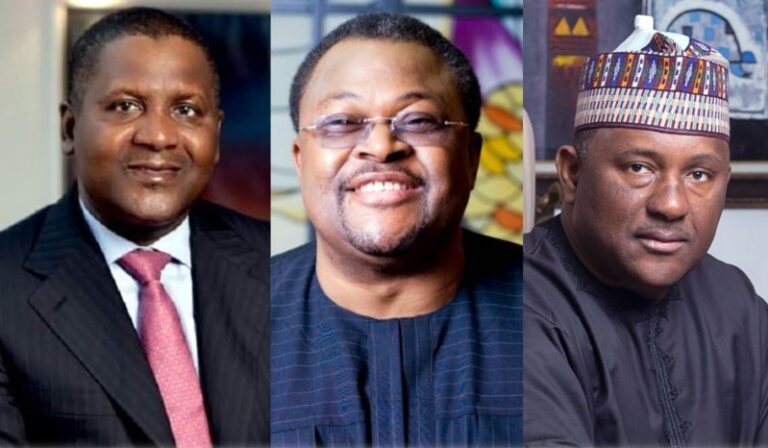Nigeria’s billionaires are transforming the business landscape, rewriting the rules of wealth generation across the African continent. Amid challenges like fluctuating currency values, regulatory hurdles, and infrastructure deficits, these moguls are thriving—driving not only their own fortunes but also contributing to the economic growth of the nation.
Unlike the previous reliance on oil booms and governmental patronage, today’s Nigerian billionaires are diversified. They are reshaping industries like energy, telecommunications, power, and infrastructure, while tackling Nigeria’s most pressing issues with locally driven solutions. At the forefront of this new wave are figures like Aliko Dangote, Mike Adenuga, Femi Otedola, and Abdulsamad Rabiu—who, despite facing ongoing challenges, continue to redefine success in Nigeria’s economy.
Aliko Dangote: The Industrial Giant
With a fortune of $23.9 billion, Aliko Dangote remains Africa’s richest individual. His immense success, previously rooted in cement and sugar, is now anchored in energy. His $23 billion Dangote Refinery, Africa’s largest petroleum refinery, has become a game-changer, addressing Nigeria’s long-standing energy crisis. The refinery, now operational after years of delay, promises to eliminate Nigeria’s reliance on imported fuel, save billions in foreign exchange, and provide affordable energy for millions.
Dangote is also making bold moves into automotive manufacturing, having partnered with Stellantis to create Dangote Peugeot Automobiles Nigeria (DPAN), a factory assembling Peugeot vehicles in Nigeria. His diversified empire spans across cement, sugar, flour, and petroleum, and his $400 million investment in Ethiopia aims to double his cement plant’s production. Dangote’s empire is a model for reinvestment and vertical integration, fostering job creation, strengthening local supply chains, and preserving foreign exchange.
Mike Adenuga: A Silent Billionaire with Bold Investments
Mike Adenuga, Nigeria’s second-richest man with a fortune of $6.8 billion, is best known for his ventures in telecommunications and oil. His telecom company, Globacom, is the second-largest network in Nigeria, with over 60 million subscribers. Globacom’s strategic expansion into fiber optics has positioned Adenuga at the heart of Nigeria’s burgeoning digital economy.
Adenuga’s Conoil Producing holds six oil blocks in Nigeria’s Niger Delta, and his investment in Glo-1, a 6,100-mile submarine internet cable, has improved broadband access across West Africa. Adenuga’s business model emphasizes indigenous development, demonstrating how strategic risk-taking and infrastructure investments can catalyze growth across various sectors.
Abdulsamad Rabiu: Cementing a Legacy
Abdulsamad Rabiu, the founder of BUA Group, is one of Nigeria’s key industrial figures. His company’s massive influence in cement production and sugar refining is complemented by his recent foray into refining and petrochemicals. Rabiu’s vision includes the construction of a 200,000 barrels per day refinery in Akwa Ibom, which will produce high-quality fuels and polypropylene for both domestic and regional markets.
Rabiu’s success stems from his early days as an importer of iron, steel, and chemicals, leading to the creation of BUA Group, which now dominates several industries. His strategic investments in manufacturing and infrastructure development serve as a blueprint for sustainable African entrepreneurship.
Femi Otedola: Reinventing Power
Femi Otedola’s reinvention is one of the most remarkable stories in Nigeria’s billionaire class. Once an oil magnate, Otedola pivoted to the power sector, becoming the chairman of Geregu Power, a company that now supplies a significant portion of Nigeria’s electricity grid. His investments have played a crucial role in the privatization of Nigeria’s power sector, which continues to experience severe challenges.
Otedola has also made significant investments in Nigeria’s financial sector, with stakes in FBN Holdings and Zenith Bank, further cementing his influence. His resilience and ability to adapt in a rapidly evolving market serve as a testament to the potential for growth in Nigeria’s diverse sectors.
Challenges and Succession Questions
Despite their successes, these billionaires face significant challenges. Naira volatility, shifting government policies, and Nigeria’s persistent infrastructure deficits remain key issues that threaten the stability of their empires. Additionally, with most of these magnates in their 60s, questions about succession loom large. Will their children or appointed successors be able to continue their legacies, or will a new generation of entrepreneurs rise to challenge their dominance?
What’s clear is that these billionaires are more than just wealthy individuals—they are architects of a new economic order in Nigeria, and their influence will shape the country’s future. Their commitment to solving Nigeria’s problems with local solutions is not just transforming their own businesses but is also laying the foundation for a more resilient and self-sufficient economy. As 2025 unfolds, Nigeria’s billionaire class is proving that with the right vision and determination, homegrown wealth can redefine Africa’s business landscape.

